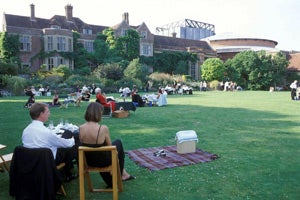Glyndebourne - Arias for the crunch
Glyndebourne's 75th-anniversary season hopes to beat the recession, writes Michael Church

Great oaks from little acorns: the old proverb rings particularly true of Glyndebourne Festival Opera, whose birth in 1933 was noted in The Daily Telegraph under the faintly surprised headline "THEATRE BUILT BY OWNER: Mr John Christie's 'Private Bayreuth'". "An interesting venture," opined Musical Opinion cautiously, "the building of a miniature opera house, combining beauty with the last word in utility, in the heart of the Sussex Downs." But people were soon aware that something momentous had occurred. "Whoever cares for the supreme things of opera supremely well done," said The Times, "and can afford, perhaps at the expense of some other pleasure, to cultivate their taste, will find their answer there." That was after the curtain had fallen on the first Glyndebourne Figaro.
Not everyone thought Glyndebourne was worth sacrificing other pleasures for. When Idomeneo got its first professional British staging at Glyndebourne, London's Evening News looked into its wallet and took umbrage: "Our Festival visitor will find that a visit for two persons, taking into consideration railway and coach fares, the price of the seats, the dinner and other amenities, will leave very little out of a £10 note. Is the entertainment of a quality to justify such expenditure? With Idomeneo, definitely not." Moreover, that judgement came prefaced by a snide blast which is still echoed in some quarters today: "Glyndebourne Opera is a rendezvous of fashion – some have called it by a harsher name – for which musical people, and people who wish to be thought musical, climb into evening dress early in the afternoon." But that "wish to be thought" was just sour grapes: as EMI's new box set The Very Best of Glyndebourne on Record incontrovertibly proves, performance standards were stratospherically high from the start. And how could they not be, with the brightest operatic exiles from Nazi Germany at the helm?
The Glyndebourne of today has massively extended its scope – with the annual tour, the cinema broadcasts, the CDs and DVDs, and the groundbreaking education projects with their collaboration with the local high-security jail. It's worth remembering that Glyndebourne was the first British opera house to screen its productions through the Odeon, Empire, and Vue chains, as well as through a string of independent cinemas with ticket prices starting at £10. Screening its performances all over North America and the Antipodes, and even in Japan, Glyndebourne has spread its message far and wide. So much for the charge of "exclusivity".
Moreover, it looks as though Glyndebourne is going to be one of those home-grown British luxuries (such as caravans and Waitrose canapés) which are doing fine despite – and maybe even because of – the recession. Corporate bookings are slightly down on last year: boardroom belt-tightening applies to Glyndebourne as it does to all other cultural frills at present. But ticket sales are up, with ordinary punters getting a better-than-usual chance of seeing the most popular shows, and all this year's productions are fully sponsored. And there's no mystery about why this should be. Like all top opera houses, Glyndebourne books its stars and plans its financial activities four years ahead, so it's no surprise that the recession has so far caused nothing more serious than a reduction of the planned fundraising gala (with ticket prices from £1,000–£2,000) to a mere "celebration concert" (at £100–£500). On the other hand, this year's recession may have a substantial impact in two years' time – but now is too early to tell.
Moreover, as Glyndebourne's general director, David Pickard, points out, the grim reaper hovers ominously. A Mori research poll in 2003 found that the average audience age was 67, "and now it will be significantly older, so we have to replenish from below". Hence the "under-30s" nights offering the best seats in the house for £30; hence the fact that they are filming three of this season's shows – Richard Jones's directorial take on Verdi's Falstaff, a Jonathan Kent/Paul Brown version of Purcell's The Fairy-Queen, and Annabel Arden's production of L'Elisir d'Amore.
Dropping in on technical director Dave Locker, I discover that The Fairy-Queen is this year's big backstage challenge. "I've just been forced to veto the late addition of three extra flying figures," he says, warily. "We couldn't afford them. 'Health and safety' dictates that you have to bring in specialised companies to install such things, which would have raised the cost by thousands." Props manager Paul Brown (no relation to the designer), meanwhile, is wrestling with how to realise a vintage coxed-four shell for a Forties Falstaff. A real one would have been very expensive, as well as being too long for the set, so the Henley rowing museum is advising on a foreshortened version.
This year's season includes a revival of Nikolaus Lehnhoff's exquisite production of Tristan und Isolde, with Vladimir Jurowski on the podium, but there's no question which show will sell quickest. That will be the revival of David McVicar's smash-hit production of Handel's Giulio Cesare, starring Sarah Connolly in the title role and with the effervescent Danielle de Niese – now, as the bride-to-be of John Christie's grandson Gus, the crowned queen of Glyndebourne – as her paramour.
The season starts with 'Falstaff' on 21 May. Tickets £10-£210, and £30 for under-30s for certain performances. For details call the box office on 01273 813813.
Subscribe to Independent Premium to bookmark this article
Want to bookmark your favourite articles and stories to read or reference later? Start your Independent Premium subscription today.

Join our commenting forum
Join thought-provoking conversations, follow other Independent readers and see their replies